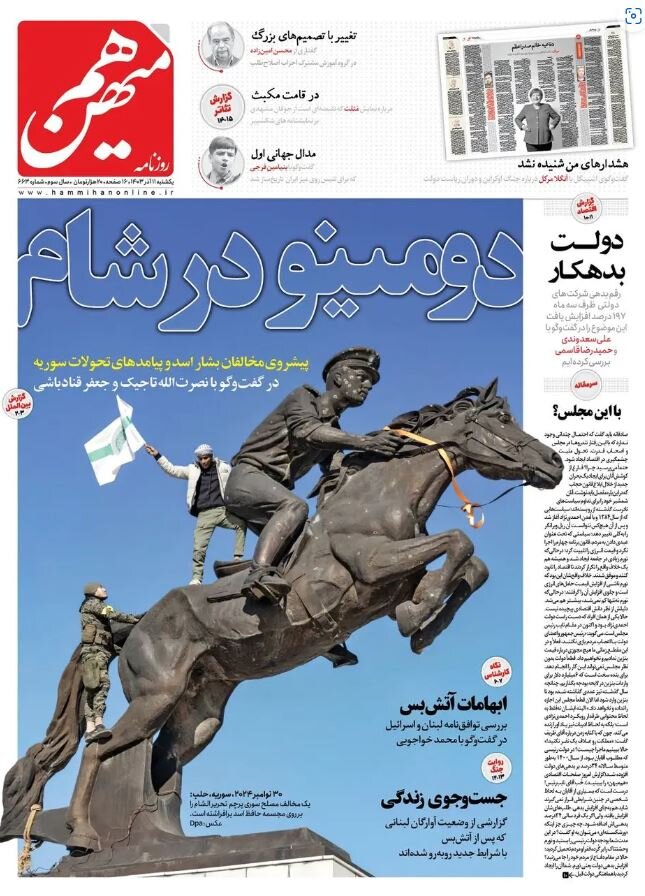Ham Mihan: Iran and Europe's efforts to get out of nuclear deadlock

TEHRAN - In an analysis, Ham Mihan dealt with the efforts of Iran and Europe to get out of the nuclear deadlock and said: It seems that the European Union and the Troika have once again taken up the failed project of building a security consensus against Iran under the management of the Zionist regime.
They intensified the sanctions against the Islamic Republic of Iran and passed two unconsidered resolutions against the peaceful nuclear program of our country. According to the spokesperson of the British diplomatic service, we are committed to taking every diplomatic step to prevent Iran from obtaining nuclear weapons, including through the “snapback” mechanism if necessary. These statements show that the snapback is gradually becoming a challenge in Europe-Iran relations. But these three countries, through different diplomatic channels, are seeking to reduce the tension over the Iran nuclear issue and are not reluctant to engage in diplomacy with Iran. Therefore, perhaps the Geneva meeting (on Friday) can be seen as an opportunity for the other parties to stay away from any miscalculations and explain the views and demands of the Islamic Republic of Iran in detail.
Jam-e-Jam: Negotiations and failed policy of maximum pressure
In a note, Jam-e-Jam discussed the resumption of negotiations between Iran and three European countries and said: The new round of negotiations between Iran and Europe started on Friday after two years of suspension. Of course, these negotiations were held behind closed doors and in a tense and distrustful atmosphere. The main causes for such an atmosphere are the recent actions of the Union in imposing new sanctions against Iran, as well as drafting a censure resolution against our country's nuclear program (at the IAEA Board of Governors). Recent actions and sanctions against Iran by Europe showed that they want to stand by Donald Trump and pursue the failed policy of maximum pressure on Iran. However, some people in Iran believe that Europe is trying to take the leadership of nuclear negotiations from America with these measures. But most experts believe that Europeans’ opposition to Trump's withdrawal from the JCPOA at that time was superficial. By claiming to stay in the agreement and encouraging Iran to continue its commitments to the one-sided agreement, Europeans wanted to stop Iran's nuclear progress so that they could buy time in favor of America and its policy of maximum pressure.
Hamshahri: Saudi Arabia's important offer to Iran
In a commentary, Hamshahri discussed Bloomberg's report about Saudi Arabia's proposal to increase trade cooperation with Iran. It wrote: In a report on its website, the Bloomberg news network said Saudi Arabia is seeking to strengthen relations with Tehran on the eve of Donald Trump's new round of presidency. According to experts, the motivation for such a proposal by Saudi Crown Prince Mohammed Bin Salman was to reduce Iran's tensions with the West. Saudi Arabia, on the other hand, wants to strengthen its relations with the United States of America. The Saudis see the two-faceted policy of closer relations with Tehran and Washington as geopolitically important. It is not yet clear what proposal Mohammed bin Salman has made to the Iranian side, but the trade between the two competing countries can be focused on food and pharmaceutical products that are not subject to Western sanctions in the initial stages.
Etemad: Iran's military, and technological abilities important in balance of power
In an interview with Ahmad Shirzad, a former reformist parliamentarian, Etemad discussed the effect of the ceasefire between Hezbollah and Israel on developments in Iran and the region. He said: The news of the ceasefire between Israel and Hezbollah has been finalized, but the news of terrorist moves in Aleppo, Syria, has been published in the media. Since Hezbollah has close relations with Iran, some of its movements are linked to Iran. Iran succeeded in making good achievements in the recent conflicts. The most important achievement of Iran was that it made clear that it is not afraid of Israel's brutality and is ready to defend itself. It is not possible to predict whether the missile confrontation between Iran and Israel will end in an unwritten and undeclared ceasefire, but it will certainly be very effective in future calculations. Iran's military, technological, and scientific capabilities will play a serious role in the future balance of power. Iran needs peace to resolve the basic problems at home. Of course, Iran needs to show its regional enemies, especially Israel, that it is not afraid of military confrontation. But welcoming tension is not part of the government's plans.
